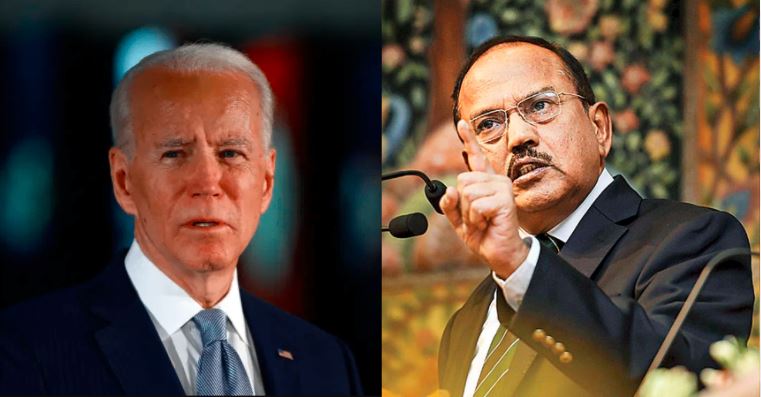US President Joe Biden did not want to help India in fighting the ongoing COVID-19 surge. When India asked for vaccine raw materials, the Biden administration said no. US State Department spokesperson Ned Price even said, “Number one, we have a special responsibility to the American people…It is not only in the US interest to see Americans vaccinated; but it is in the interest of the rest of the world to see Americans vaccinated.”
So, why did the Biden administration suddenly agree to supply vaccine raw materials to India? Did the US President suddenly realise his mistake and have a change of heart? Well, of course not. The truth is India’s National Security Advisor Ajit Doval had a little chat with his American counterpart, Jake Sullivan. The effect and consequence of the conversation were such that the Biden administration had to agree on the issue of supplying raw materials.
After Doval’s call with Sullivan, NSC Spokesperson Emily Horne issued a statement. Among other things, Horne said, “The United States has identified sources of specific raw material urgently required for Indian manufacture of the Covishield vaccine that will immediately be made available for India.”
Not just vaccine raw materials, Horne also said, “To help treat COVID-19 patients and protect front-line health workers in India, the United States has identified supplies of therapeutics, rapid diagnostic test kits, ventilators, and Personal Protective Equipment (PPE) that will immediately be made available for India. The United States also is pursuing options to provide oxygen generation and related supplies on an urgent basis.”
Earlier, the US did have an excuse for denying the supply of raw materials to India. Biden had invoked the Defense Priorities and Allocations System Programme (DPAS) under the Defense Production Act (DPA) on vaccine raw materials. DPA, a wartime legislation, was thus being used to deny the crucial supplies to India.
Clearly, Biden did not voluntarily agree on the issue of raw materials, but he had to agree in consequence of the Doval-Sullivan conversation.
Actually, Doval had a major lever, which he could have used to arm-twist the Biden administration. American vaccine makers- Pfizer-BioNTech and Moderna, use m-RNA technology for manufacturing COVID-19 vaccines. A crucial ingredient used in the manufacturing of such vaccines is supplied by an Indian company.
We are talking about Mumbai-based pharma and nutraceutical speciality ingredient maker VAV Lifesciences and its subsidiary VAV Lipid. Through a deal, this company supplies highly purified ‘synthetic phospholipids’ required for manufacturing vaccines to a US-based multinational contract development and manufacturing organisation (CDMO).
The CDMO further uses the lipids made by VAV to make gene-based lipid nanoparticles (LNPs) for exclusive use in American COVID-19 vaccines of Pfizer-BioNTech and Moderna.
Arun Kedia, Managing Director, VAV Lifesciences said, “LNP technology is considered a medical breakthrough in vaccine-based delivery systems. It has enabled the development of mRNA-based Covid-19 vaccines at a blistering pace. We are proud to be the first and only Indian company to produce high-quality phospholipids that have been approved for use in these novel vaccine delivery systems.”
Phospholipids are in fact produced at a very low scale throughout the world. There are not many alternatives as only 3-4 organisations manufacture them. Biden had probably not realised that India possessed a strong bargaining chip in the form of phospholipids. If Sullivan tried to deny raw materials to India for too long, Doval could have easily pulled this string. The US too understands that if India stops supplying phospholipids, then the American vaccine industry would stand immediately handicapped.
As such, Doval had Joe Biden by his neck, and Sullivan would have understood the perils of not allowing the supply of raw materials to India. Doval, therefore, came to the rescue at a critical moment and the results are for everyone to see.








